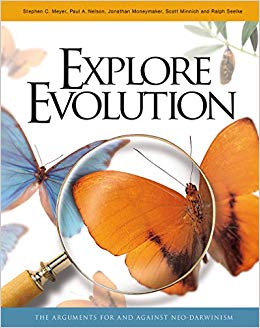This book does exactly what it says on the cover and puts very thoroughly both sides of the scientific debate concerning origins. This book is really meant to be used as a textbook promoting enquiry-based learning, and encouraging students to participate in the process of discovery, deliberation and argument that scientists use to form their theories.
Explore Evolution looks at five areas of biology that are typically viewed as confirming the modern theory of evolution: fossil succession, anatomical homology, embryology, natural selection, and natural selection with mutation.
For each area of study, Explore Evolution explains the evidence and arguments in support of Darwin’s theory and then examines the evidence and arguments that lead some scientists to question the adequacy of Darwinian explanations. Each chapter concludes with a section called ‘Further debate’ that explores the current state of the discussion.
The textbook is ideally suited for use in the classroom and for teachers who wish to increase their understanding of the strengths and weaknesses of modern evolutionary theory. With detailed analyses and a balanced portrayal of various contrasting views, it offers an insight into how science works in the real world.
The thoughtful student will be empowered to think more critically, recognising the difference between actual ‘facts’ and the ‘spin’ which may occasionally accompany their presentation. So he or she will be better placed to reassess their own views – in short, trained how to think instead of simply being told what to think.
In terms of its use in schools, in recent years successive UK governments have sought to promote this approach in science education throughout the curriculum. To accommodate this new emphasis, examination boards have rewritten their specifications at all key stages and a whole new raft of secondary and tertiary level textbooks have been published.
Moreover, teachers are required to explore the ‘moral, social, cultural and spiritual implications’ of each topic (Promoting and evaluating pupils’ spiritual, moral, social and cultural development, OFSTED, 2004). This is nowhere more pressing than in the field of biological origins. In the debate over origins, students deserve to be allowed to explore the evidence for and against evolution in the science classroom, and this should include a consideration of the possibility that organised complexity is purposeful and the product of intelligent causation.
The book is not primarily about geology, but uses classical geological timescales. The reviewer and most of the creation community will of course take a catastrophic (Flood) view of the rocks, but this of course does not negate the basic argument used here, since what the book does is show that even on the basis of a long age view of the fossils, the evidence does not really stack up.
It would have helped if, against Figure 1:3 in the chapter on fossils succession, reference to the alternative viewpoint was made (such as Ohrstrom P., 1987, ‘Geochronology as a metaphysical research program’, Journal for general philosophy of science,18:204-214; and Vardiman L., Snelling A. and Chaffin E. F. (Eds.), 2000 and 2005, Radioisotopes and the age of the earth, Volumes 1 and 2, Institute for Creation Research, Santee). However this point is not vital to the argument.
Explore Evolution shows that even using the traditional gradual development hypothesis, the fossil evidence does not favour common evolutionary descent. The book actually has a great use in the classroom since, rather than immediately diverting on to age of earth issues (important as these are), it concentrates on what is the supposed fossil evidence for evolution, followed by a careful examination of homology, embryology, biogeography, natural selection and molecular machines. The constant use of case studies makes each of these subjects come alive for the reader.
There are of course many other related current debates in physics and chemistry relevant to the broader questions of origins – debates over the origin of the universe and the origin of life itself. These have also been deliberately left to one side, so that in a balanced and fair exploration of the evidence for and against Darwin’s theory of evolution, students can be inspired to examine the evidence, and think through the issues for themselves.
When I first looked at this book, I was sceptical that it was useful for the cause of creation-based thinking. It only deals with the science and is not in any way touching on the biblical theology arguments, which for a believer are so vital. It does not link the evidence to worldviews and the biblical creation position at all.
However, as I have considered it, particularly in its UK edition with all the US English styles altered for a UK audience, I would very much recommend it. There is a place for such science only books. The very fact that it presents fairly both sides of the scientific argument on origins should make it appeal to a wide range of readership and should in an unbiased environment encourage healthy and robust debate.
Those from both positions (holding to creation or evolution), and not necessarily Christian believers, will benefit greatly by examining the opposing view to their own. As a young earth creationist, I have found it very useful to see this excellent summary of the arguments for and against each position, and I would suggest that within the evangelical church (where there is also division on the issue) this book highlights very fairly what the issues are that scientifically must be addressed.
It is thoroughly researched, well produced and should, in my view, be in every secular and church library across the UK.
This review, first published in Evangelicals Now, is used with permission.
The reviewer is grateful for input from Dr Geoff Barnard.





